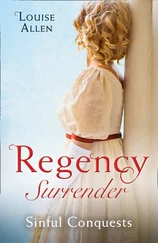‘How did you know that?’
‘At one time, I played a very minor role in an attempt to make sure that the very many French émigrés who cluttered up London were actually who they said they were and not spies.’
‘Goodness,’ she said, looking at him properly for the first time since he’d made that jest about doing her worst. ‘I knew you’d got into Parliament, but I never imagined you ever doing anything useful. I thought you’d been one of those who used their position to cut a dash in town and treated the House of Commons as nothing more than a highly select sort of gentlemen’s club.’
‘Oh, no, I wanted to use my position to make a difference,’ he said bleakly. ‘It just...didn’t work out that way.’
She decided not to press for reasons why it hadn’t worked. It wouldn’t be very pleasant for him to talk about his total failure as a politician, even in such a junior role.
‘Did you find out much about my Monsieur Le Brun? It is just that he claims to have property in England and the means to look after Fenella, as well as having a string of unpronounceable titles and a claim on some land in France. If he is lying, it would be tremendously useful to know about it now.’
‘I cannot recall much about him, to be honest,’ he told her. ‘It took me some time to work out where I’d seen him before, because I met him at only one or two gatherings thrown for émigrés claiming to be friends of England.’ And he’d done his best to blot out as much of that portion of his life as possible. If he didn’t dwell on it, he’d hoped it would all fade into the mist, rather than remain fixed at the foreground in lurid detail.
‘He was only one of many that were under subtle investigation. What has he told you?’
She pouted. ‘Well, he says that he is using his work as a courier as cover to enter France and see how the land lies. See whether it is possible to have some of what was confiscated from his family restored, now that the Bourbons are back in power. He claims he dare not move about openly under his true name, in case there are still enemies lurking in wait for him.’
‘It could all be true,’ he said. ‘There are a lot of people attempting to reclaim land and titles that were once theirs. And he was certainly introduced to me in London as the dispossessed Comte de...somewhere or other. It was what made me refer to him as the man who calls himself Monsieur Le Brun.’
‘It would certainly account for his excessive arrogance,’ she huffed. ‘There are times when I can quite understand why French peasants wanted to teach the aristocrats a lesson—though not, of course, quite such a brutal one—whereas Fenella finds his tale wildly romantic. Which was what made the rest of that outing almost unbearable.’ Her lips curled in disgust. ‘She would keep looking up at him as though he were a hero stepped straight out of the pages of some rubbishing novel. But,’ she concluded, ‘whether he really is a dispossessed French count, or just a mountebank, makes no difference, I suppose.’
‘How so?’
‘Well, if he is a mountebank, and has no real intention of marrying Fenella, it will break her heart. And if he is what he says he is and does marry her, it will break up our happy little household.’ For no man, particularly not a member of the aristocracy, could stomach the thought of his wife living anywhere but in his own home. ‘Neither of which outcome,’ she said glumly, ‘particularly appeal to me. I suppose that sounds selfish, doesn’t it? And it’s not that I don’t want Fenella to be happy. If anyone deserves to marry a title, even a French one—even a French one that might not actually exist any more—then it is Fenella. For she is a lady, you see. A lady born. She has been obliged to live with me only because her family cast her off when she married against their wishes. They really should have taken care of her,’ she added crossly, ‘once she was widowed. Yet they refused to have anything to do with her just because she’d married a man she loved, rather than one they approved of.’
He went very quiet for some time, before clearing his throat and saying, ‘She sounds like a very courageous woman. I was wrong to say she was mousy just because I couldn’t tear my eyes off you.’
She flushed and shifted, avoiding his gaze. She clearly wasn’t comfortable accepting compliments. Any more than he was to hear that a woman he’d dismissed as mousy had done what he’d not had the sense to do: defy his family and marry the woman he wanted.
Not that he’d ever got to that point. His father had tricked him into withdrawing before he’d come up to scratch.
The fiacre lurched to a halt.
‘Here we are,’ he said, leaning over to open the door.
She stepped out of the carriage, to see they were in front of a church that reminded her just a bit of St. Paul’s Cathedral.
‘The Pantheon,’ he said, having paid off their driver. ‘After we’d talked about the way the very air of Paris seems full of revolutionary ideals, I thought you might like to come and see the tomb of the man responsible for so much of it.’
‘You’ve brought me to look at a tomb?’
‘Not just any tomb. The tomb of Voltaire. Besides, there’s much more to see in here than tombstones. Have you ever seen anywhere quite so awe-inspiring?’
She had to admit the building was impressive, with its soaring pillars and multiple domes. They wandered about, admiring the place for some time before coming to a halt before the tomb Nathan had said he’d brought her here to see.
‘There was a girl,’ she said, ‘selling lemonade from a stall on the Boulevard, who had a copy of the Henriade in her pocket. I so wanted to ask her what she thought of it, but Monsieur Le Brun wouldn’t let me stop.’
‘Well, he probably doesn’t approve of peasants having any education. Or they wouldn’t have risen up and thrown his class out.’
‘Your class, too,’ she reminded him.
‘Ah, but not in Paris. Didn’t I tell you, now I’m in Paris I can be whoever I want to be?’
‘Do you think...no, never mind.’
‘What? You can ask me anything, Amy.’
‘You won’t like it.’
‘How do you know, unless you try me?’
‘Because you’re a man,’ she said with disgust. ‘Men don’t like women to have their own ideas.’
‘Ouch.’ He pretended to flinch. ‘That is a little unfair, even for you.’
‘Very well, then,’ she said, flinging up her chin. ‘I will tell you what I wanted to ask that lemonade seller, shall I? I wanted to know if women here in France really do have more freedom than the English. Because everywhere I look, there are women presiding over the cash desks of bars and businesses. Clearly the ones in charge. And it isn’t just because they’ve had to, because the men have all gone off fighting. The men are coming back. And instead of taking over their old jobs, they’re hanging around in packs, in their uniforms, letting the women carry right on running everything.’
He stroked his chin with one hand. ‘I hadn’t really noticed it. But you are right.’
She blinked. ‘I am?’
‘Don’t sound so surprised. You are clearly an intelligent woman. And you are looking at this city with a woman’s eyes. You are bound to see things I’ve missed.’ When she continued to gape at him, he chuckled. ‘Has nobody ever paid you a compliment before?’
‘Not about my intelligence,’ she said. ‘Not men, anyway. Most men want a woman to stay quiet, or agree with everything they say.’
‘No chance of that with you, is there?’
‘Not any longer, no. Not after the way—’ She bit back what she had been going to say.
‘The way I let you down?’
She shook her head, frowning. ‘It wasn’t so much what you did, Nathan. It was how my family treated me. I was...well, there’s no point in trying to deny it, since you claim you knew how badly you hurt me. I was devastated. I needed them to comfort me, but instead they...they turned against me.’
Читать дальше












